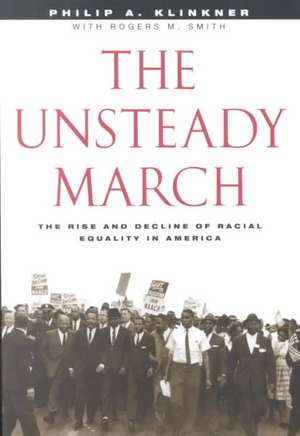The Unsteady March: The Rise and Decline of Racial Equality in America
Autor Philip A. Klinkner, Rogers M. Smithen Limba Engleză Paperback – 14 iul 2002
American life is filled with talk of progress and equality, especially when the issue is that of race. But has the history of race in America really been the continuous march toward equality we'd like to imagine it has? This sweeping history of race in America argues quite the opposite: that progress toward equality has been sporadic, isolated, and surrounded by long periods of stagnation and retrenchment.
"[An] unflinching portrait of the leviathan of American race relations. . . . This important book should be read by all who aspire to create a more perfect union."—Publishers Weekly, starred review
"Could it be that our unswerving belief in the power of our core values to produce racial equality is nothing but a comforting myth? That is the main argument put forth by Philip Klinkner and Rogers Smith . . . The Unsteady March is disturbing because it calls into question our cherished national belief and does so convincingly. . . . [It] is beautifully written, and the social history it provides is illuminating and penetrating."—Aldon Morris, American Journal of Sociology
Winner of the Horace Mann Bond Award of the W.E.B. Du Bois Institute for Afro-American Research at Harvard University.
"[An] unflinching portrait of the leviathan of American race relations. . . . This important book should be read by all who aspire to create a more perfect union."—Publishers Weekly, starred review
"Could it be that our unswerving belief in the power of our core values to produce racial equality is nothing but a comforting myth? That is the main argument put forth by Philip Klinkner and Rogers Smith . . . The Unsteady March is disturbing because it calls into question our cherished national belief and does so convincingly. . . . [It] is beautifully written, and the social history it provides is illuminating and penetrating."—Aldon Morris, American Journal of Sociology
Winner of the Horace Mann Bond Award of the W.E.B. Du Bois Institute for Afro-American Research at Harvard University.
Preț: 270.66 lei
Nou
Puncte Express: 406
Preț estimativ în valută:
51.79€ • 53.43$ • 43.22£
51.79€ • 53.43$ • 43.22£
Carte tipărită la comandă
Livrare economică 26 martie-09 aprilie
Preluare comenzi: 021 569.72.76
Specificații
ISBN-13: 9780226443416
ISBN-10: 0226443418
Pagini: 426
Ilustrații: 8 tables
Dimensiuni: 152 x 229 x 38 mm
Greutate: 0.64 kg
Ediția:1
Editura: University of Chicago Press
Colecția University of Chicago Press
ISBN-10: 0226443418
Pagini: 426
Ilustrații: 8 tables
Dimensiuni: 152 x 229 x 38 mm
Greutate: 0.64 kg
Ediția:1
Editura: University of Chicago Press
Colecția University of Chicago Press
Notă biografică
Philip A. Klinkner is an associate professor of government at Hamilton College.
Rogers M. Smith is the Christopher H. Browne Distinguished Professor of Political Science at the University of Pennsylvania.
Rogers M. Smith is the Christopher H. Browne Distinguished Professor of Political Science at the University of Pennsylvania.
Cuprins
Acknowledgments
Introduction: The Unsteady March
One: "Bolted with the Lock of a Hundred Keys"
The Era of Slavery, 1619-1860
Two: "Thenceforward, and Forever Free"
The Civil War, 1860-1865
Three: "The Negro Has Got as Much as He Ought to Have"
Reconstruction and the Second Retreat, 1865-1908
Four: "The Color Line"
Jim Crow America, 1908-1938
Five: "Deutschland and Dixieland"
Antifascism and the Emergence of Civil Rights, 1938-1941
Six: "Double V: Victory Abroad, Victory at Home"
World War II
Seven: "Hearts and Minds"
The Cold War and Civil Rights, 1946-1954
Eight: "There Comes a Time"
The Civil Rights Revolution, 1954-1968
Nine: "Benign Neglect?"
Post-Civil Rights America, 1968-1998
Conclusion: Shall We Overcome?
Notes
Index
Introduction: The Unsteady March
One: "Bolted with the Lock of a Hundred Keys"
The Era of Slavery, 1619-1860
Two: "Thenceforward, and Forever Free"
The Civil War, 1860-1865
Three: "The Negro Has Got as Much as He Ought to Have"
Reconstruction and the Second Retreat, 1865-1908
Four: "The Color Line"
Jim Crow America, 1908-1938
Five: "Deutschland and Dixieland"
Antifascism and the Emergence of Civil Rights, 1938-1941
Six: "Double V: Victory Abroad, Victory at Home"
World War II
Seven: "Hearts and Minds"
The Cold War and Civil Rights, 1946-1954
Eight: "There Comes a Time"
The Civil Rights Revolution, 1954-1968
Nine: "Benign Neglect?"
Post-Civil Rights America, 1968-1998
Conclusion: Shall We Overcome?
Notes
Index
















